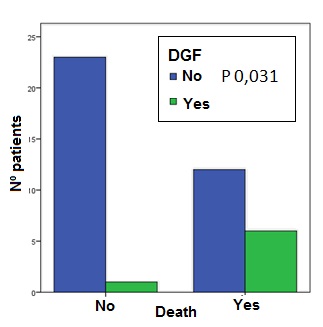Delayed Graft Function as a Survival Prognostic Factor in Elderly Recipients of Kidney Transplantation
Nephrology and Kidney Transplantation, Hospital Clínic of Barcelona, Barcelona, Spain
Meeting: 2019 American Transplant Congress
Abstract number: B168
Keywords: Elderly patients, Graft failure, Infection, Risk factors
Session Information
Session Name: Poster Session B: Kidney Donor Selection / Management Issues
Session Type: Poster Session
Date: Sunday, June 2, 2019
Session Time: 6:00pm-7:00pm
 Presentation Time: 6:00pm-7:00pm
Presentation Time: 6:00pm-7:00pm
Location: Hall C & D
*Purpose: Kidney transplantation (KT) provides advantages in terms of survival compared with dialysis. However, in elderly recipients, despite a better long-term survival, a high mortality rate has been described in the initial period after the transplantation.
*Methods: The main objective is to evaluate graft and patient survival. We reviewed the evolution of recipients ≥75 years subjected to a KT between June 2004 and November 2017. Patient and graft survival are analyzed according to the characteristics of the donor and the recipient.
*Results: 42 recipients were identified. There were 4 (9.5%) living donors, 32 (76.2%) DBD, 5 (12%) DCD type III, and 1 (2.38%) DCD type II. 68.4% of the recipients had a high-moderate cardiovascular risk and 92% were expanded criteria donors (> 65 years old). Seven recipients (16%) presented delayed graft function. The acute rejection rate in the first year was 21%. Censoring death, only one graft loss was registered due to ABMR. During follow-up, 18 (42.9%) recipients died, and the mortality during the first year was 11.9% (n=5). Infections were the main causes of death (83%). The delay in graft function was associated with higher mortality at 24 months (p <0.03). In addition, a suboptimal renal function after 3 months of KT (creatinine 1.5 vs. 2.4 mg/dL) was associated with mortality throughout the follow-up (p 0.024). Time on dialysis, type of donor, ischemia cold time, immunosuppressive treatment, induction with thymoglobulin, recipient history of diabetes or cardiovascular risk were not significantly associated with mortality.
*Conclusions: Mortality during the first year after the KT is high, around 12%. Delayed graft function is the main factor associated with worse survival in KT recipients ≥75 years, so it is important to be aware of the factors that may contribute to delayed graft function.
To cite this abstract in AMA style:
Piñeiro GJ, Guillen E, Ventura P, Torregrosa JV, Gelpi R, Revuelta I, Cofan F, Sousa EDe, Cucchiari D, Ugalde J, Oppenheimer F, Diekmann F, Esforzado N. Delayed Graft Function as a Survival Prognostic Factor in Elderly Recipients of Kidney Transplantation [abstract]. Am J Transplant. 2019; 19 (suppl 3). https://atcmeetingabstracts.com/abstract/delayed-graft-function-as-a-survival-prognostic-factor-in-elderly-recipients-of-kidney-transplantation/. Accessed March 3, 2026.« Back to 2019 American Transplant Congress


